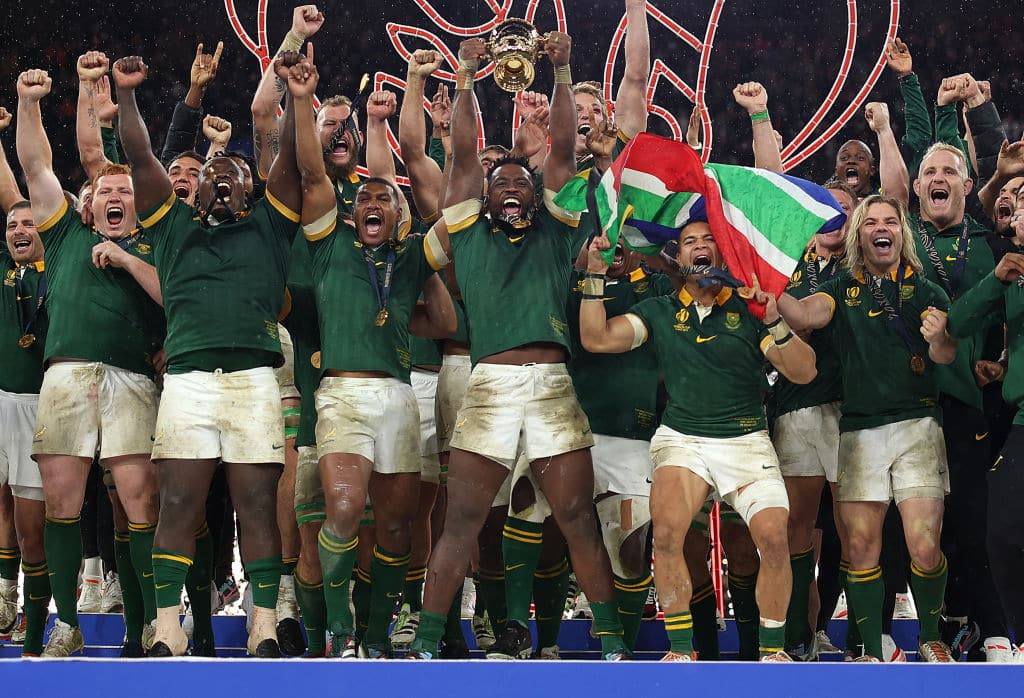SOUTH AFRICA’S UNPRECEDENTED RECORD FOURTH RUGBY WORLD CUP WIN GOES FAR BEYOND SPORTING EXCELLENCE – IT WAS A STUDY IN FUTURE PLANNING, ORGANIZATION, LEADERSHIP AND MENTALITY.
South Africa’s record fourth World Cup title was a seminal moment for the game in the country and highlighted the huge strides forward rugby has made in igniting a passion for the game among supporters of all races.
In a country struggling with an electricity crisis, economic downturn, high unemployment, crime and corruption, the Springboks’ 12-11 World Cup final win over New Zealand provided a rare chance to celebrate.
But the win goes far beyond sporting excellence and those who spearheaded it hope it can be a blueprint for success in all walks of South African life.
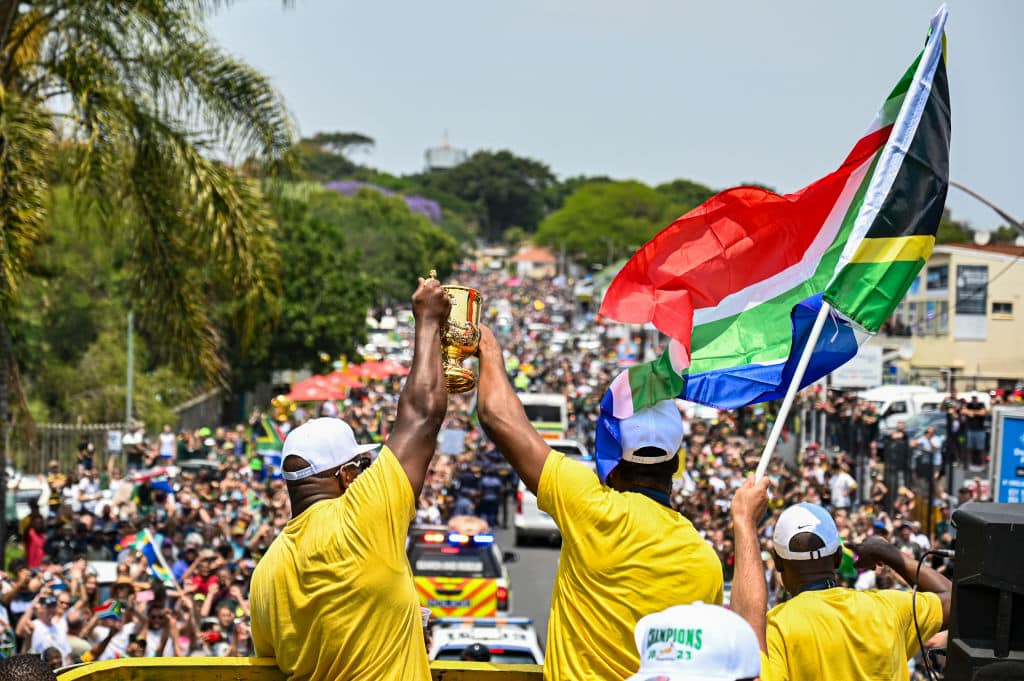
The sight of thousands of adoring supporters lining the streets to see the team on their trophy tour in Soweto, South Africa’s largest township, was particularly striking given how rugby was once perceived to be the sport of the white Afrikaner during apartheid.
Loading...
Those scenes were replicated across the country and showcase not only the love and admiration supporters have for the side, but also the deep respect for an unprecedented achievement.
The Springboks became the first team to lift the World Cup trophy on four occasions and the win was achieved with much more than skill and physical prowess alone, it was a study in future planning, organization, leadership and mentality. No team has had a harder path to victory, with South Africa meeting each of the other top six sides in the world rankings on their road to the trophy.
One point wins over hosts France, a dogged England and old foes New Zealand in the knockout stages was a test of their character as well as skillset.
Former Springbok flyhalf Joel Stransky kicked the winning drop-goal in extra-time when the side lifted their first World Cup title in front of a beaming Nelson Mandela in 1995.
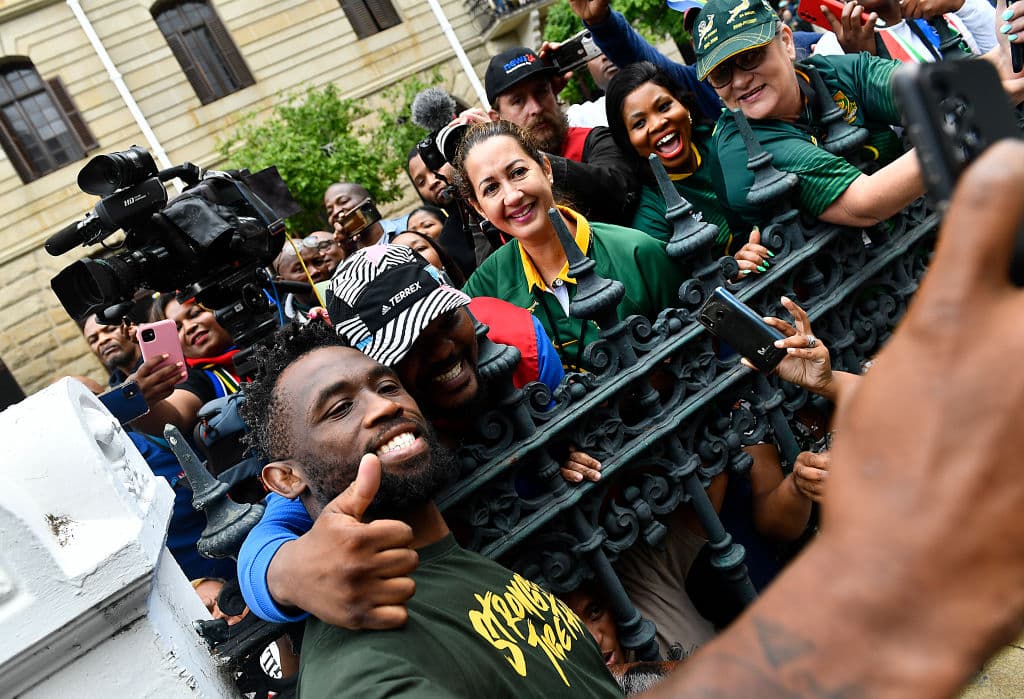
He was in France in a broadcast role and got to see the side operate at close quarters. He explains to FORBES AFRICA in an exclusive interview the secret to their success.
“That tough mentality is born from a few things,” Stransky says. “It comes from the huge effort that goes into what they do, a team spirit and genuine love for each other, and a burning desire to succeed. This team has a wonderful culture. “They work their socks off for each other and leave no stone unturned in preparation for every match. They also have that South African never-say-die attitude where they find a way to win games that other teams cannot. They are an exceptional bunch.”
Eloquent captain Siya Kolisi is a hugely-respected figure in the game around the world and in the aftermath of their victory spoke at length about the unity within the side and the fact that their diversity, with players coming from such different backgrounds, is what binds them together.
“We are a diverse and beautiful team from all walks of life. This trophy is for those who come from tough, disadvantaged areas,” Kolisi said.
“For the kid who needs to know that while things are tough for you, and you can’t afford school fees, you have no shoes to walk to school and no food at home, you can make something out of your life. Even when the situation does not look hopeful.
“We come from those backgrounds, this team represents everybody. We want people to say, ‘who can I look to that has made it from this situation’, and that is us. You can look at this team.”
It was a sentiment echoed by scrumhalf Cobus Reinach, whose upbringing could not have been more different than Kolisi’s, but whose mentality is the same.
“It feels very uniting,” he said. “It is not our trophy, it is everyone in South Africa’s trophy. We might be 33 players (in the World Cup squad), but our driving force is the people of South Africa and we couldn’t have done it without them.”
Kolisi is the undisputed captain of the side but as Stransky points out, successful teams are made up of leadership groups, whose own perspectives and experiences are valued and listened to too.
“In every team you have lots of leadership, especially in the national set-up because there are lots of guys who captain other (club) sides and are natural leaders.
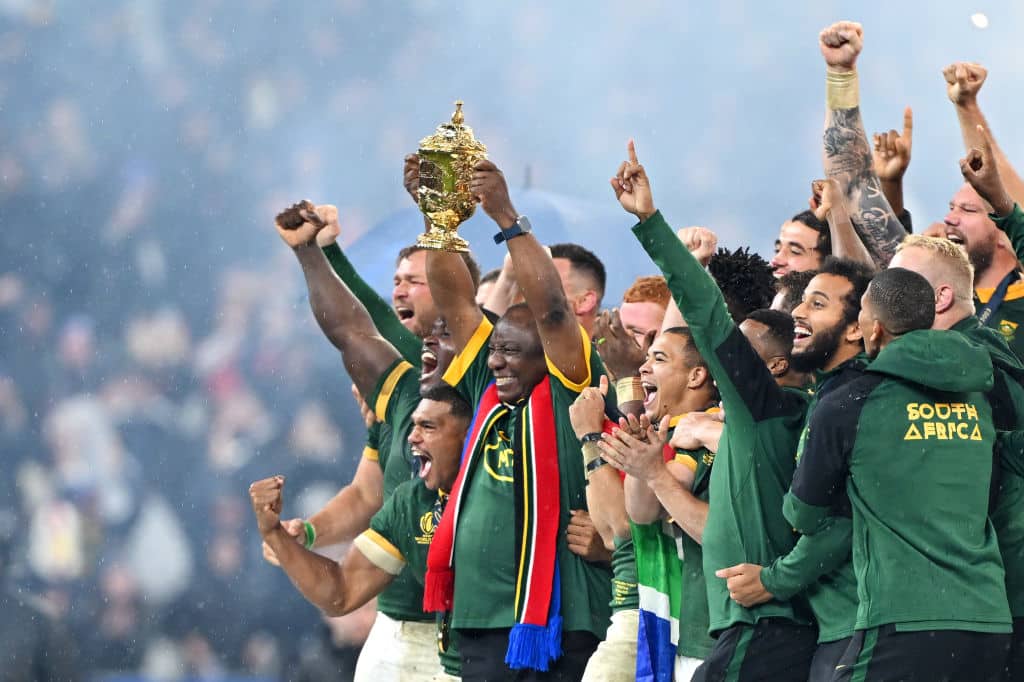
“But at the top of the leadership group you are still a proper, genuine captain who is respected and loved by everyone and Siya is that guy.
“As a human being he is just the most amazing guy. He is obviously thorough in his preparation and training, but as a human being he is sensational, and that is why they will follow him to the ends of the earth.”
The world may love Kolisi, but the Springboks are not universally admired despite their success and drew criticism during the tournament for what was viewed as a dour style of rugby and a controversial use of a 7-1 split between forwards and backs on the bench.
The criticism leveled at them is that they are all power and no finesse, and that does not make for an entertaining product for fans.
“Well done to South Africa, the best at not playing rugby,” screamed a headline in New Zealand Herald, while pundits shouted loudly about the bench being against the spirit of the game, and the need to depower scrums, a major weapon of the Springboks.
“When we look back at it in 20 years’ time, no one is going to say, ‘what was the style of play that day’,” Stransky says. “Where our coaching team has been exceptional is that they have looked at the laws of the game and the areas where the referees are focussing on.
“They have said, ‘these are our strengths, so how can we be at our best inside the parameters of the laws’. They have picked horses for courses and played a different game-plan against different opposition when required.”
Director of rugby Rassie Erasmus and departing head coach Jacques Nienaber had to think out of the box after losing key hooker Malcolm Marx early in the tournament, making the inspired decision to bring in flyhalf Handré Pollard as his replacement. He had missed out in the original squad due to a calf injury.
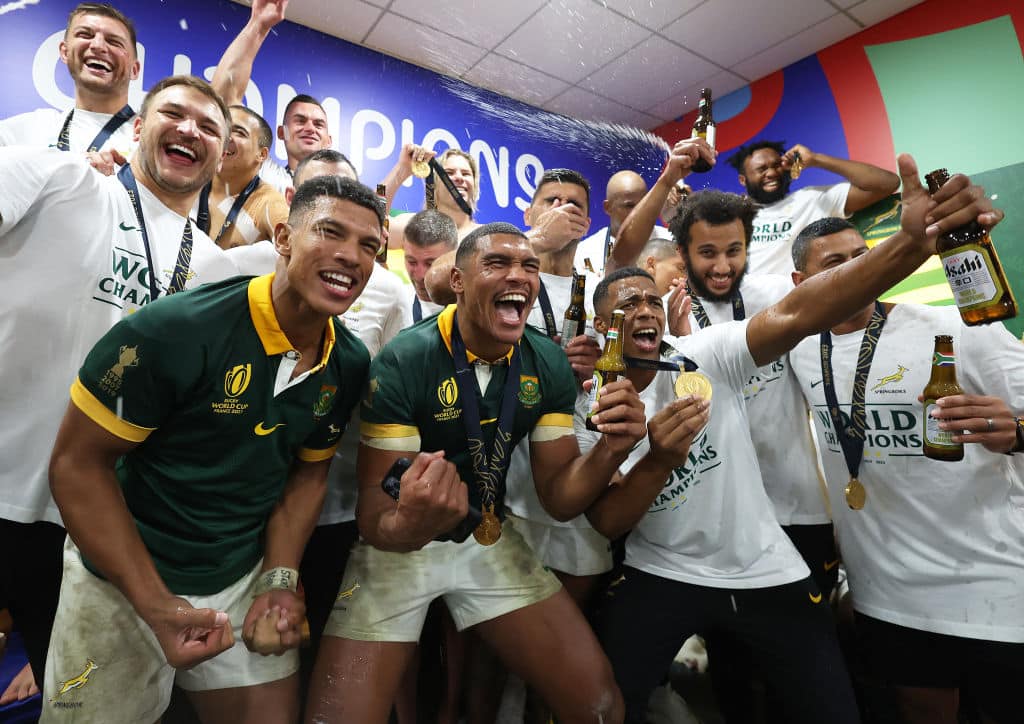
There were question marks over the kicking accuracy of Manie Libbok and given that Pollard was successful with all 13 of his kicks at goal, including difficult shots in the knockout rounds, it was perhaps the key decision from the coaching team that led to the win.
But it meant flanker Deon Fourie had to cover at hooker, a position he had not played in five years and never at test level.
His is a remarkable story, having been the oldest Springbok debutant in history at the age of 35 in July 2022. He played 77 minutes of the final in the front row of the scrum after an early injury for starter Bongi Mbonambi and ended up as captain of the side with Kolisi off the field at the final whistle.
“If you had told me two years ago that I would be standing here with a World Cup winner’s medal, I would’ve laughed and said you are smoking some weird stuff,” Fourie says.
“That emotion you saw after the whistle was relief. The last three weeks (of the tournament), winning by one point, it was stressful. Grafting it out at the end.
“There was relief, then happiness, and finally disbelief that I was on the field and winning a World Cup.”
Players like Fourie will inevitably step aside, some immediately and others in a year or two as the team builds towards the next tournament in Australia in 2027. It is the inevitable nature of a World Cup cycle and key for the Springboks will be maintaining their edge through this process.
“I see huge change coming,” Stransky says. “It will be a huge rebuilding process. In that starting line-up (in the final against New Zealand), I counted maybe five or six players who will be at the next World Cup.
“There are others in the squad who will slot in but there are also a lot of empty spaces where we will need to bring in youngsters and build a new team around some of the older hands. It will be a period of transition.”
What the Springboks have achieved is difficult to illustrate fully. Only four teams have won the World Cup in history, and no-one else has done it four times.
But aside from their on-field excellence, it is also their relatability that sets them apart. This is a team without egos, who show that hard work and unifying behind a common goal can bring the ultimate rewards.
“As a team, we want to be a reference point for our people, to show them how we can do it, and hopefully they’ll get hope from this team,” Kolisi said.
“This was not about us as players. This victory was for every South African, and we showed what is possible with this diverse team. “I hope that going forward in business, in everyday life, that we understand that the team only won because we decided to put our different cultures and differences aside and focus on the country. I think that’s the most important thing.”
Loading...
